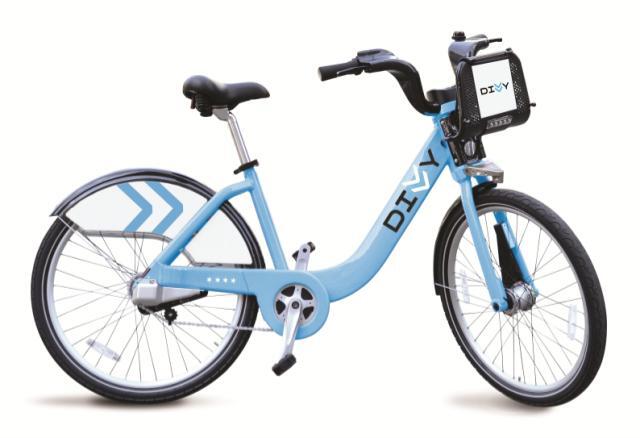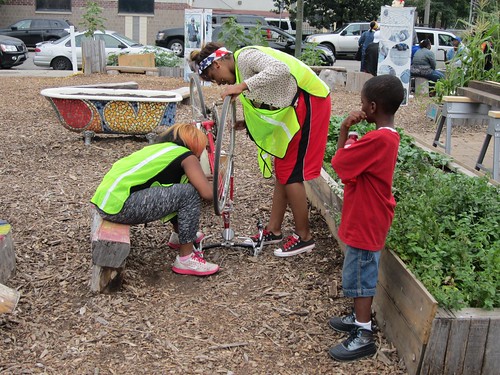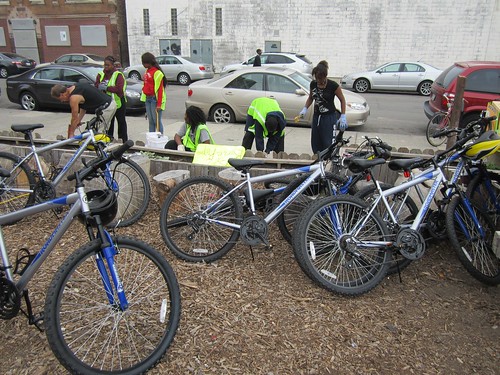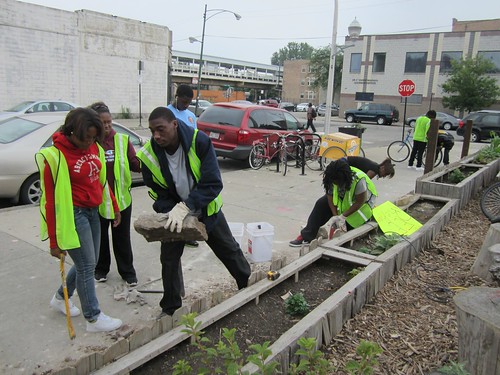[This article also ran in Checkerboard City, John's column in Newcity magazine, which hits the streets on Wednesday evenings.]
As I pedaled up to the Bronzeville Community Garden, 51st and Calumet, on a Wednesday afternoon, smooth R&B drifted from a sound system and folks were gathered around a table made of colorfully painted repurposed wood, gazing intently at a chess game. Planter boxes held a variety of greenery, including tall stalks of corn, and an old bathtub covered with a swirling mosaic design sat full of soil, ready for planting.
Soon a group of ten teenagers would show up on mountain bikes to make improvements to the garden and do free bicycle repairs for community members. They’re apprentices with the Greencorps Chicago youth program, a project closely aligned with the Chicago Department of Transportation’s Divvy bike-share system.
The planned coverage area for Divvy’s first 400 docking stations stretches from 63rd to Devon, including a number of low-income neighborhoods like Bronzeville, and CDOT has applied for funding to further expand the system. However, many Chicago communities won’t be getting bikes during this first round of installations.
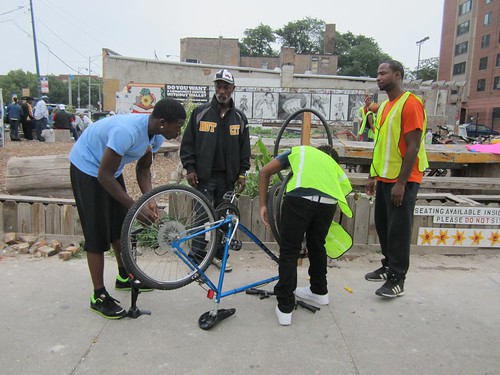
Students repair a bike for a resident while Victor Rollins, right, supervises. Photo: John Greenfield
To help make sure bike-share benefits all Chicagoans, not just those in the initial coverage area, there’s a job-creation element to the program. Roughly 20 percent of the Divvy work crew, about 20 people, was hired through Skills for Chicagoland’s Future, a job-training program for unemployed people. Other bike-share employees are graduates of adult programs offered by Greencorps, a CDOT division that trains ex-offenders and people recovering from substance abuse in environmentally oriented fields like landscaping and urban agriculture.
In addition, the city’s contract with Alta Bike Share, which runs Divvy, includes a requirement for the youth program, which is being run by Greencorps in cooperation with the Department of Family and Support Services. 600 teens from violence-prone neighborhoods were selected for paid apprenticeships, receiving six weeks of training in bike safety and repair, as well as horticulture.
120 of the top-performing participants will continue to work for Greencorps for ten hours a week throughout the school year. After that, about 20 of those teens will be hired as apprentices at Divvy, helping out with assembly and maintenance of the bikes and stations, and assisting the crew with “rebalancing,” relocating cycles from one station to another. Other graduates of the program are likely to find jobs at nonprofit and for-profit bike shops, and urban farms.
CDOT assistant commissioner Sean Wiedel and Greencorps program director Edde Jones met me at the community garden to tell me more about the apprenticeships. “There are youth in this program who are basically the type of kids who said they didn’t go to school, didn’t bother, didn’t show up,” said Wiedel. “Suddenly they’re coming to this program and they’re loving it.”
“It’s providing a non-traditional learning environment for folks who have struggled in a traditional learning environment, and it seems to really work,” added Jones.
Some of the tasks that the kids who work at the Bronzeville Community Garden have been doing include reclaiming wood from a nearby building teardown, pulling the nails from the planks, and building gardening beds and a fence, as well as salvaging old bricks to build cold frames—miniature greenhouses used to extend the growing season. The students will also be mulching, planting ornamentals and vines, and cultivating Echinacea plants in the bathtub to attract butterflies and bees.
The teens rolled in, after biking three miles from their classroom at 2929 South Wabash, with their instructor Jason Sonnefeldt and “mentor” Victor Rollins. Sonnefeldt explained that about half of the teens from his class were missing that day, but they had a good excuse: they were on a field trip visiting college campuses with an “Upward Bound” program run by the Bronzeville-based nonprofit Dime Child Foundation.
The instructor tells me how he got the kids into biking shape. “We started going on casual, leisurely rides to get their muscles warmed up,” he says. “We went north to the Shedd Aquarium one day, and that was about six miles,” he said. “And then we went south to Promontory Point, which was a ten-mile ride. I’ve been pushing them pretty hard, so that way when we ride to the garden it doesn’t feel so bad.”
“This program is teaching the kids to get actively involved in their communities and it teaches them to make creative change,” said Rollins, who has ten years of experience working with at-risk youth. “A lot of the things that they’re seeing within their neighborhoods are very negative. This helps them to empower themselves and give back to their community.”
The teens from Sonnefeldt and Rollin’s group come to the garden every Wednesday to fix bikes. On the day I visited, a couple of adults showed up with flat tires, and the kids were ready with patch kits and pumps. One boy stood on the corner holding a sign advertising the repair services. A carpenter who’s volunteering with the program showed up to help the students break up concrete to make room for the new fence.
Brian Davis, 18, told me that after a few weeks of training, he now feels comfortable doing bike repair. “I know how to patch inner tubes, put a new inner tube in, and put a bike together,” he said. “We go around and fix bikes, plant plants, and help the community out. The riding is fun too; it just takes a little while to get used to it.”
After successfully tag-teaming a flat repair with another girl, Tonaa Jamerson, 17, told me she was surprised by how much she enjoys wrenching. “At first I thought only the boys need to do the mechanic work,” she says. “But Jason showed me how easy it is to fix a flat. It only takes five minutes and it makes a lot of people happy.”
